Exploring the Trails of the Transatlantic Slave Trade in Ghana reveals the deep historical roots embedded in the country’s landscape. Sites like Cape Coast and Elmina Castles stand as stark reminders of the past, drawing visitors into the somber narratives of those who endured unimaginable hardship. The Door of No Return serves as a powerful symbol of loss and resilience, inviting reflection on the collective memory of a nation. As one uncovers these stories, questions arise about how this history shapes contemporary Ghanaian identity and the ongoing efforts to honor those who suffered.
Good To Know
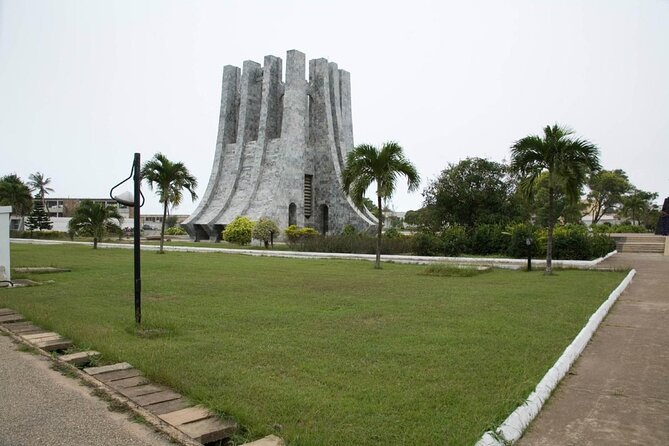
- Cape Coast Castle and Elmina Castle are pivotal sites reflecting the brutal realities of the Transatlantic Slave Trade in Ghana.
- The Door of No Return symbolizes the final exit point for countless enslaved individuals during their harrowing journey.
- The W.E.B. Du Bois Center in Accra provides insights into the history and impact of the African diaspora.
- Engaging with local communities through tours and artisan interactions deepens understanding of Ghana’s cultural heritage and resilience.
- Visiting these historical sites fosters remembrance and education about the lasting effects of the slave trade on Ghana.
Historical Significance of Ghana
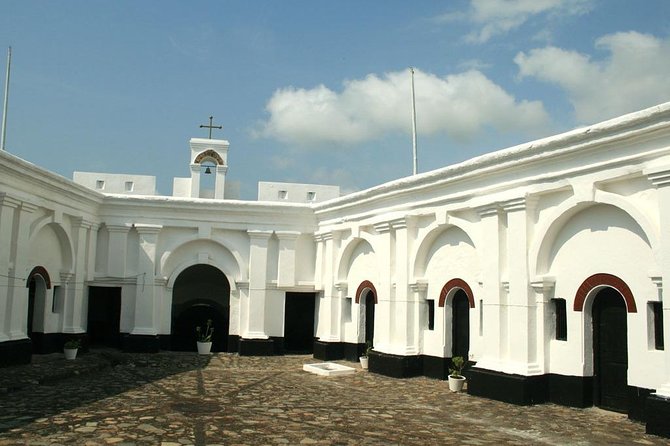
Ghana stands out as a pivotal player in the history of the transatlantic slave trade, where its coastal forts and castles served as grim departure points for countless enslaved individuals.
These structures, like Cape Coast Castle and Elmina Castle, symbolize the harrowing journey many endured. The region’s strategic location made it an essential hub for European traders, who exchanged goods for human lives.
This dark chapter profoundly impacted Ghana’s cultural and social landscape, shaping its identity and resilience.
Today, Ghanaians confront this painful legacy, fostering dialogue and remembrance. The historical significance of Ghana isn’t just a story of loss; it’s also about survival and strength, reflecting a nation’s ongoing journey towards healing and understanding.
You can also read our reviews of more tours and experiences in Accra.
Key Locations to Visit
What key locations should one explore to truly understand the legacy of the transatlantic slave trade?
A visit to Cape Coast Castle is essential, where many enslaved people were held before their harrowing journey.
Elmina Castle, another significant site, offers deep insights into the brutal realities of the trade.
The Door of No Return symbolizes the final exit for countless individuals, making it a poignant spot for reflection.
In Accra, the W.E.B. Du Bois Center provides a rich narrative on the African diaspora and its history.
Plus, the Kwame Nkrumah Mausoleum commemorates Ghana’s independence and the struggle against colonialism.
These sites not only educate visitors but also honor the memories of those impacted by this tragic chapter in history.
Private Tour Experience

Exploring the trails of the transatlantic slave trade through a private tour offers a deeply immersive experience that connects travelers to a pivotal part of history.
This personalized journey allows participants to engage directly with the past, enhancing their understanding.
Travelers can expect:
-
Tailored Itinerary: Each tour can be customized to focus on specific interests, ensuring a meaningful exploration.
-
In-depth Insights: Professional guides share stories and historical context, fostering a deeper connection to the sites.
-
Comfort and Convenience: With private transportation, guests can relax and focus on absorbing the experience without logistical concerns.
This private tour not only educates but also evokes emotions, creating lasting memories as participants walk in the footsteps of history.
Inclusions of the Tour
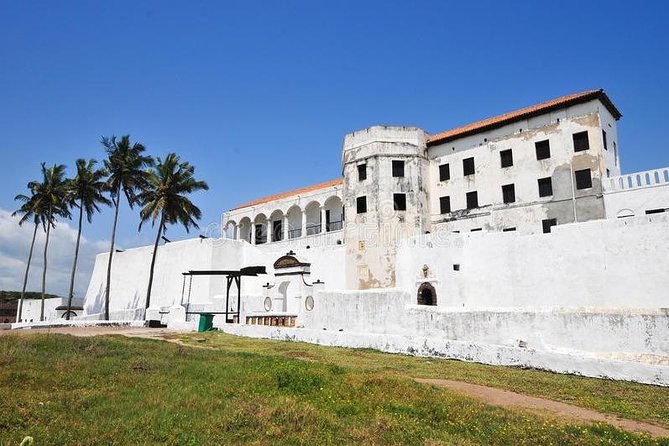
Offering a comprehensive experience, the tour includes essential amenities that enhance comfort and convenience.
Travelers enjoy a private, insured, air-conditioned car, ensuring a smooth journey through Ghana’s historical sites. With a professional English-speaking driver-guide, participants gain insightful perspectives on the transatlantic slave trade’s impact.
All fees and taxes are covered, eliminating unexpected costs. Guests also benefit from 24-hour ongoing support, making the experience worry-free.
Accommodation includes air conditioning, providing a comfortable retreat after a day of exploration. Plus, breakfast is included, offering eight delicious meals to fuel the adventure.
This tour is designed to create a seamless and enriching experience, allowing travelers to focus on the profound history that unfolds before them.
Pricing and Booking Details
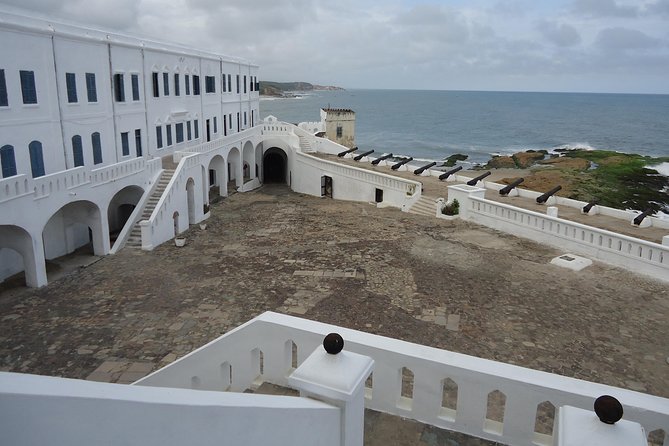
While planning a journey through the poignant history of the transatlantic slave trade in Ghana, travelers will find the pricing and booking details straightforward and accommodating.
The tour starts at $1,955.00, ensuring a premium experience with a lowest price guarantee. Travelers can enjoy:
- Free cancellation up to 24 hours before the experience starts.
- A private tour exclusively for their group, enhancing personal engagement.
- 24-hour support to assist with any inquiries or concerns.
With confirmation received upon booking, participants can expect seamless logistics, including a private air-conditioned vehicle and a professional driver-guide.
Though international airfare and meals aren’t included, the overall package provides excellent value for those wishing to explore this significant historical journey.
Cultural Insights and Education
The transatlantic slave trade trails in Ghana provide an invaluable opportunity for travelers to gain deep cultural insights and educational experiences. As visitors explore historical sites, they connect with the stories and struggles of those who endured the horrors of slavery. This journey fosters a greater understanding of Ghanaian heritage and resilience.
| Aspect | Insight |
|---|---|
| Historical Context | Learn about the impact of the slave trade. |
| Cultural Heritage | Discover traditional practices and customs. |
| Community Engagement | Interact with local communities and artisans. |
| Memorial Significance | Understand the importance of remembrance. |
| Educational Resources | Access museums and educational materials. |
Through these experiences, travelers not only reflect on the past but also appreciate the vibrant culture that endures today.
Travel Tips for Visitors
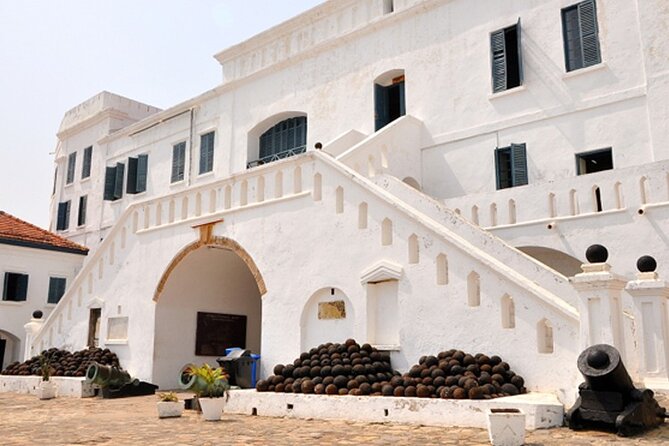
Traveling to Ghana to explore the trails of the transatlantic slave trade can be a profound experience, and a few tips can enhance that journey.
First, visitors should respect local customs and traditions, as understanding cultural nuances enriches the experience.
Second, they should pack appropriately for the warm climate, opting for lightweight clothing and comfortable shoes suitable for walking.
Lastly, it’s wise to plan ahead by booking a private tour, ensuring an informative and personalized experience.
- Embrace local culture and traditions.
- Dress comfortably for the warm climate.
- Book a private tour for a personalized experience.
Supporting Local Communities
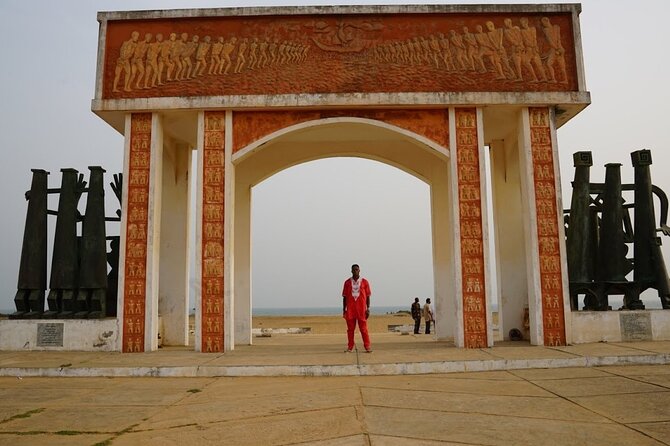
Supporting local communities during a visit to Ghana is essential for fostering sustainable tourism and cultural appreciation.
Travelers can engage with local artisans, purchasing handmade crafts that reflect the rich heritage of the region. Such support not only empowers the creators but also helps preserve traditional techniques.
Dining at local eateries allows visitors to savor authentic Ghanaian cuisine while contributing to the livelihoods of families.
Participating in community-led tours can deepen understanding of the historical significance of the transatlantic slave trade, creating a more profound connection to the sites visited.
Frequently Asked Questions
What Is the Best Time of Year to Visit Ghana for This Tour?
She believes the best time to visit Ghana is during the dry season, from November to March. The weather’s pleasant, making it ideal for exploration and ensuring visitors enjoy their experience without rain interruptions.
Are There Any Age Restrictions for Participants on This Tour?
Participants don’t face strict age restrictions on the tour. Infants must sit on laps, ensuring a family-friendly experience. Travelers of all ages can enjoy the journey, creating lasting memories while exploring this significant history.
Is Photography Allowed at the Tour Locations?
At the tour locations, photography is generally allowed. Travelers should, however, respect any specific guidelines from the guide or venue. Capturing moments enhances their experience, allowing them to share memories from the journey.
Can Dietary Restrictions Be Accommodated During Breakfast?
She wondered if dietary restrictions could be accommodated during breakfast. The tour staff assured her that they’d happily cater to specific needs, ensuring a pleasant experience for everyone on this memorable journey.
What Safety Measures Are in Place During the Tour?
The tour prioritizes safety by providing a professional driver-guide, insured vehicles, and 24/7 support. Participants can relax knowing all fees are covered, and the tour is designed exclusively for their group’s comfort and security.
The Sum Up
Visiting the trails of the Transatlantic Slave Trade in Ghana offers a profound journey into the past, connecting visitors with the resilience of the Ghanaian people. Exploring sites like Cape Coast and Elmina Castles not only educates but also fosters a deeper appreciation for history. By engaging in private tours and supporting local communities, travelers can contribute to ongoing remembrance efforts. Ultimately, this experience encourages reflection and a commitment to honoring those who endured unimaginable hardships.
More Tour Reviews in Accra
Not for you? Here's more nearby things to do in Accra we have reviewed
- Half Day Accra City Sightseeing Tour With Guide
- Half-day Accra Safari Tour
- Assin Manso Slave Camp and Castle Tour
- 14 Day Ghana Butterfly Tour
- Cape Coast and Elmina Castle Day Trip
- 3 Days Accra Historical ,Cape Coast Black Roots ,& Kumasi Culture
- Ghana 4-day Nature and Wildlife Adventure
- 2 Days (1 Night) Volta Region Waterfalls and Hiking Private Tour
- Cape Coast Castle & Kakum Rainforest Day Trip
- Time With Nature
- Private Cape Coast Heritage and Hiking Tour
- Cape Coast Root ,History, & Active Adventure Tour
